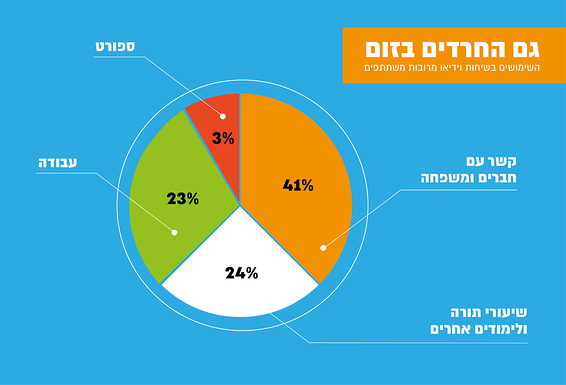Recently, it seems that the corona virus has succeeded in turning the Internet into a legitimate concept in ultra-Orthodox society, which until recently was the subject of controversy.
So how did this time it still work out?
And is it going to stay with us even after the crisis?
David Galperin reveals everything about: The ultra-Orthodox digital in the post-Corona era
By
:
David Galperin
-
yo
'
R. Age Group
If there is anything that can be said that the corona has done for us, it has made us all step out of our comfort zone and discover how we manage to manage life differently.
Some will say better, some will say more challenging - but there is no doubt that we have all undergone a change following the recent health crisis that has also become a socio-economic crisis that we do not yet see the horizon to end.
A lot of challenges have been, and still are, facing the crisis.
The need to work from home during quarantine, the need to communicate with the outside world and keep up to date with the new guidelines, the need to keep in touch with acquaintances and family members who cannot be met due to isolation or illness and even the need to purchase products or services.
While to most of us these all sound like complex but completely achievable challenges - try to imagine how these challenges can be tackled without the internet.
And now, having come to the conclusion that this is an almost impossible task, you will probably understand the following data.
David Galperin, who has been involved in advertising and marketing media for many years, has been following the issue closely. Towards the internet.
If in the past it was a sectoral taboo where only ultra-Orthodox from the modern currents could be found, then the corona has made the Internet a popular commodity even among the more conservative homes
Research
:
No longer hared by the Internet
According to data published by Bezeq, Internet traffic in the ultra-Orthodox society during the Corona period increased by about 40% and that many families and various bodies still want to install this product.
Whether it's for Torah lessons through the Zoom app, activities for the kids, video calls with family members and even updating on news needs - the internet has slowly become a legitimate matter.
In fact, the existential-survival need leads to one of the fastest Internet adoption processes that has ever taken place in Israel, in all sections of the population.
All is well and good, but the skeptics will stand up and click their tongues because it is a love that depends on the thing.
In other words, the rise of the ultra-Orthodox sector towards the districts of the network depends on time and circumstances, if it were not for the corona, we probably would not have contracted such a trend.
Nevertheless, the Internet has been alive and well among us for several decades, and just as the ultra-Orthodox have so far been careful to differentiate, so will they when rage passes.
This claim can be addressed on two levels.
The first is the predictions of sociologists who believe that the impact of exposure to the existence of the Internet and its benefits in the ultra-Orthodox sector is irreversible.
In fact many believe that even if many ultra-Orthodox families decide at the end of the Corona era to take the Internet out of the home, they will still not be able to completely erase their experience from the digital orientation.
In-depth surveys also indicate that the ultra-Orthodox will continue to use digital tools even after the crisis, so that in the end this is a profound and significant change in the lifestyle of the ultra-Orthodox population as we know it today, and even a trigger for accelerating integration in the Israeli public and general economy.
Data on the degree of content filtering on the Internet of the ultra-Orthodox public in Israel // Gil Group
The second level in which it is appropriate to address the skeptics' claim is the fact that this is an argument that ignores a significant and profound process of large increase in the use of the ultra-Orthodox on the digital platform, under the radar of the established ultra-Orthodox media.
According to a survey conducted a year ago by the Askria Institute, it was found that more than half of the ultra-Orthodox society uses the Internet.
For those of you who are in a hurry to determine that these are the margins of ultra-Orthodox society and less close factors - the survey also found that a significant percentage of yeshiva students surf the net.
And that is before the virus enters our lives.
Love the written word
-
but also the video
In fact, although until a little over ten years ago the Internet was the greatest enemy of rabbis in ultra-Orthodox society, in recent years it has become more legitimate.
Over time, websites dedicated to the ultra-Orthodox sector were established, the volume of surfing increased, and with it the percentage of ultra-Orthodox users of social networks such as Twitter, Facebook, WhatsApp and Instagram.
This fact has made the ultra-Orthodox a potential and vibrant target audience in the digital media and even helped their integration into Israeli society, its culture and even the employment market.
In addition to the WhatsApp app, which is considered a hot advertising arena that uses its groups and the status platform as a real advertising space, today you can also find ultra-Orthodox anchors on the net who serve as opinion leaders with a number of followers that will not embarrass even celebs.
And as the number of followers - so does the number of online purchases.
It is not uncommon to find that post offices in ultra-Orthodox concentrations are collapsing under the delivery load of packages ordered via the Internet.
Whether it is international sites like NEXT or ASOS, and whether it is local deliveries, there is no doubt that the ultra-Orthodox have discovered the benefits of purchasing over the internet.
In fact, during the Corona period only 5% of the ultra-Orthodox public stated that they were purchasing online for the first time.
Perhaps this is why even the ultra-Orthodox businesses in the network, which in recent years have already discovered the wonders of the network and turned through it to the general public, especially when it comes to raising funds and donations to nonprofits, now understand that it should also target the sector.
The popular industries that advertise to the ultra-Orthodox public today belong to real estate, associations and fundraising and even digital stores of various businesses.
Another characterization of the ultra-Orthodox's surfing habits on the Internet can also be seen in the content format.
If there is a lot of talk about the ultra-Orthodox's fondness for the written word, then the digital age proves that the ultra-Orthodox sector also has a corner in its heart for the videotaped video.
Indeed, many of the videos distributed in the sector, organic or advertising, go viral and gain uniqueness across the general sector.
Segmentation of data on the type of video calls used by the ultra-Orthodox public in Israel // Gil Group
Know how to identify opportunities
Those who were able to identify the trend from the very beginning were the sectoral advertising agencies, and especially those that opened entire departments that specialize in digital in general and digital for the ultra-Orthodox population in particular.
Gil Group, headed by David Galperin, is the largest business group in Israel operating in the ultra-Orthodox sector in the field of marketing, advertising and advanced media solutions.
The group has existed since 1999 and just like the ultra-Orthodox sector has developed over the years in accordance with the waves in the field.
Under the group you will find subsidiaries such as "Gil Advertising" which provides marketing, branding, strategy and advertising services to businesses, "Gil Street" active in the field of street awareness, signage and direct mail, "Gil Print" for print productions and "Gil Gift" for branded gifts .
All of these were recently joined by Gil Digital, a company that specializes in creating and developing digital campaigns for ultra-Orthodox companies or for brands that appeal to the ultra-Orthodox audience.
"Today it is clear to everyone that the ultra-Orthodox sector is a significant purchasing power, and the companies growing in the economy are investing in a growing budget sector," says Galperin. More, fly more and spend more.However, it is a mistake to treat them as more customers from the general public.Because it comes from a more conservative society, the ultra-Orthodox audience differs in many digital characteristics compared to the Israeli public and to reach it accurately requires in-depth knowledge of the sector, culture "It stems from it and the social norms from which it feeds. This is exactly the service we can provide as a company that comes from the sector and knows it in depth - from the campaign managers, to the content person and the graphic designer, so the result is more authentic than ever."
David Galperin - Chairman of Gil Group // Gil Group
Indeed, today everyone already knows that the secret of a winning digital campaign is, among other things, the segmentation of messages and the right targeting, the one that will lead you to exactly the right person, at the right time and with the right words.
This matter, which usually requires a thorough and demanding study of the target audience and its surfing and consumption habits, is becoming a major issue in the ultra-Orthodox sector, not just digital.
As a sector that even in the institutionalized and printed media - is behind quite a few different newspapers each designed for a different stream - digital characterization is becoming an almost distinct craft for those who swim well in the arena of different communities.
But unlike print media advertising, which requires strict control over visibility and messages - digital advertising allows you as a business owner to enter from the back door of almost any home in the sector, probably now after the Corona period.
"It can be said that the corona crisis has brought many challenges to ultra-Orthodox society, but also quite a few opportunities," Galperin concludes. "Now all we have to do is identify all of these in time and succeed in leveraging the success we have enjoyed for years." .
src = "https://www.facebook.com/tr?id=496136937851506&ev=PageView&noscript=1"
/>
What is stated in the article includes content and commercial / marketing information, and the Israel Today system is not responsible for its reliability.
The publication of the contents and commercial information in the article does not constitute a recommendation or offer by the Israel Today system to purchase and / or use the services or products in the article.















